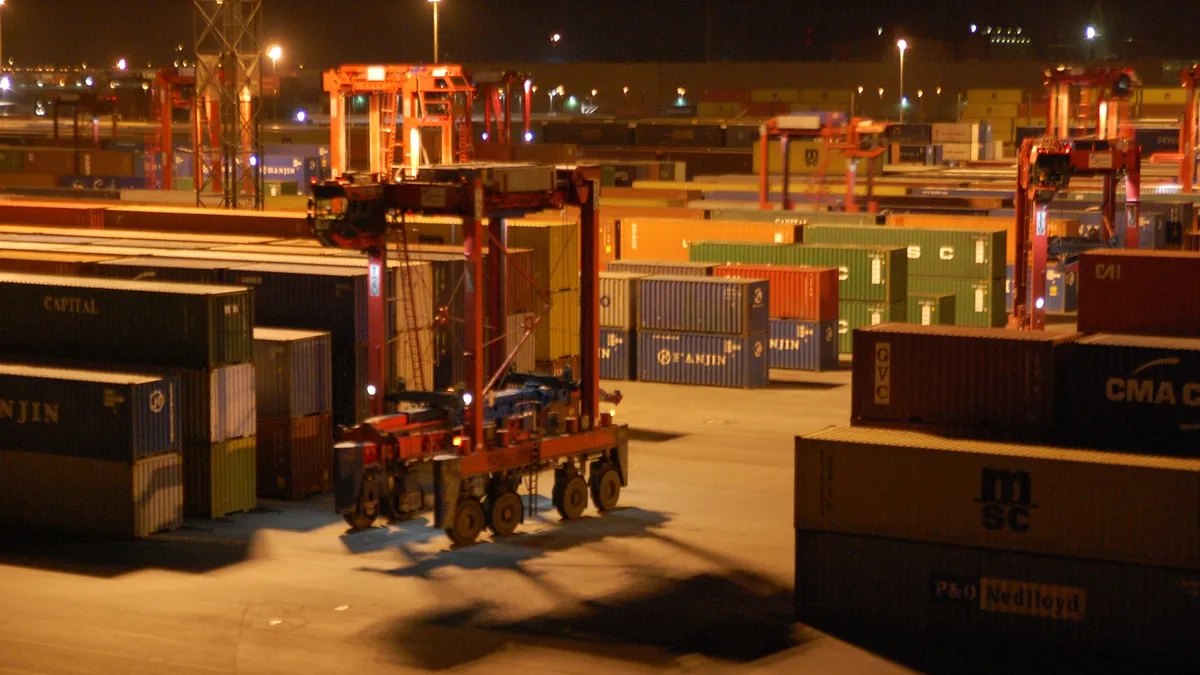Dive Brief:
- Tired of long dwell times at ports, For Truckers by Truckers last week organized 100 truck drivers to protest a meeting of the Port of Virginia Board of Directors and draw attention to their cause.
- Rising cargo volumes at the Port of Virginia have led to increased congestion at terminals, and drivers are frustrated with the lack of compensation for time spent in wait. "We should not be held against our will for the excessive wait times," George Berry, director of For Truckers by Truckers, told Supply Chain Dive.
- The protest, he says, was successful in its initial goals and building a movement. The drivers will discuss their grievances with the port's Chairman of the Board of Directors on April 30 and are willing "to take it all the way to the state capital."
Dive Insight:
A national conversation over port wait times is ramping up, with strong voices emerging across the supply chain.
Dwell time has long been a key indicator for port efficiency, with terminals across the world referencing (or hiding) their metrics to attract shippers. As cargo volumes rise, ports have struggled to manage the assets needed — from chassis to longshore labor to truck drivers — to get containers out of terminals and into shippers' hands.
"There's no fix in place for what we're enduring currently, which are three to four to five hours" of dwell time, Berry said.
The problem has only been aggravated for drivers by the recently enforced electronic logging device (ELD) mandate.
"Your time is still counted for every minute you're in there," Berry said. "Often times, drivers can't make it to their customers ... and they're frustrated at us most of the time."
Berry is frustrated the Port of Virginia is spending hundreds of millions of dollars to dredge the channel and prepare for bigger ships and volumes but not allocating funds to the dwell time problem. He said more chassis and implementing a port dwell fee were a few ways money could be allocated to fix the issue.
Some ports are piloting reservation systems, night gate hours and other projects as solutions to congestion.
The Port of Virginia is currently piloting a reservation system at Norfolk International Terminal, as one idea. But, it's far from perfect, according to Berry. "I see some flaws in it," he said, noting the app used to create appointments is not driver friendly, complicating the process.
For Truckers by Truckers and the Port of Virginia are just the latest supply chain actors to face this issue head-on.
In a related move, the Federal Maritime Commission this week launched an investigation into demurrage and detention charges by carriers — or fees for storing and transporting containers after a set "free time" period whereby responsibility of cargo is scheduled for transfer.
While the probe focuses on carrier practices, it touches on the larger inefficiencies at ports that affect — and are often caused by — all actors.
"It is critical that shippers, dray truck companies, and other affected parties who can document specific allegations and provide supporting materials of unreasonable port detention and demurrage practices and fees step forward and cooperate with the investigation," the agency wrote in a press release, adding information can be sent to [email protected].
In the meantime, Berry is looking forward to meeting with the Port of Virginia by the end of the month to "come up with some serious solutions."














